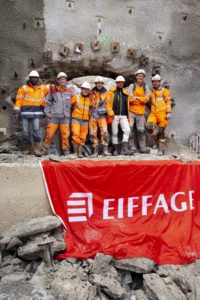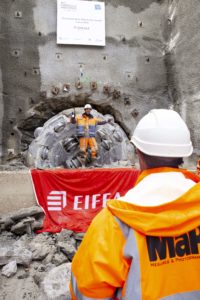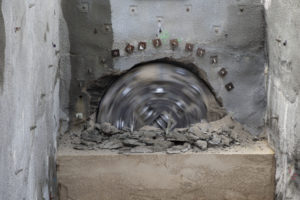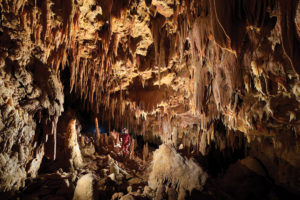Galerie des Janots Main Beam completes Arduous French Drive
 In April 2019, a Robbins 3.5 m (11.5 ft) diameter Main Beam TBM broke through into open space, completing its 2.8 km (1.7 mi) long tunnel. It was not the first time the machine had encountered open space: twice during tunneling, the machine hit uncharted caverns, the largest of which measured a staggering 8,000 cubic meters (283,000 cubic ft) in size.
In April 2019, a Robbins 3.5 m (11.5 ft) diameter Main Beam TBM broke through into open space, completing its 2.8 km (1.7 mi) long tunnel. It was not the first time the machine had encountered open space: twice during tunneling, the machine hit uncharted caverns, the largest of which measured a staggering 8,000 cubic meters (283,000 cubic ft) in size.
The obstacles overcome at the recent breakthrough are a significant achievement, said Marc Dhiersat, Project Director of the Galerie des Janots tunnel for contractor Eiffage Civil Construction. “We are proud to have led a motivated and conscientious team to the end of the tunnel who worked well without accidents despite the many technical difficulties encountered.”
The water tunnel, located below the community of Cassis, France, is an area of limestone known for its groundwater, karstic cavities, and voids. The limestone, combined with powdery clays, made for difficult excavation after the machine’s March 2017 launch. At the 1,035 m (3,395 ft) mark, the crew hit a cavern on the TBM’s left side. The cavern, studded with stalactites and stalagmites, was grazed by the TBM shield. The crew had to erect a 4 m (13 ft) high wall of concrete so the TBM would have something to grip against. The TBM was then started up and was able to successfully navigate out of the cavern in eight strokes without significant downtime to the operation—the process took about two weeks. Despite the challenges, Dhiersat thought positively of the TBM throughout the ordeal: “This has been the best machine for the job due to all the geological difficulties.”
 The first cavern, while the largest, was not the most difficult void encountered. The machine was averaging 20 to 22 m (65 to 72 ft) advance per day in two shifts after clearing the first cavity, with a dedicated night shift for maintenance. While excavating, a combination of probe drilling and geotechnical BEAM investigation—a type of electricity-induced polarization to detect anomalies ahead of the TBM—were used. Crews ran the excavation five days per week, achieving over 400 m (1,310 ft) in one month. This performance continued until the 2,157 m (7,077 ft) mark, when the machine grazed the top of an unknown cavity that extended deep below the tunnel path. The structure measured 22 m (72 ft) long, 15 m (49 ft) wide, and 14 m (46 ft) deep, or about 4,500 cubic meters (159,000 cubic ft) of open space.
The first cavern, while the largest, was not the most difficult void encountered. The machine was averaging 20 to 22 m (65 to 72 ft) advance per day in two shifts after clearing the first cavity, with a dedicated night shift for maintenance. While excavating, a combination of probe drilling and geotechnical BEAM investigation—a type of electricity-induced polarization to detect anomalies ahead of the TBM—were used. Crews ran the excavation five days per week, achieving over 400 m (1,310 ft) in one month. This performance continued until the 2,157 m (7,077 ft) mark, when the machine grazed the top of an unknown cavity that extended deep below the tunnel path. The structure measured 22 m (72 ft) long, 15 m (49 ft) wide, and 14 m (46 ft) deep, or about 4,500 cubic meters (159,000 cubic ft) of open space.
Crews probed in front of the cutterhead and began work to stabilize and secure the cavity with foam and concrete, as well as excavate a bypass gallery. “After filling much of the cavity (1,500 m3/53,000 ft3), our biggest difficulty was to ensure the gripping of the machine: We needed six bypass galleries and four months of work to reach the end of this challenge,” said Dhiersat. For the last 600 m (2,000 ft) of tunneling, “we were finally in good rock,” he emphasized. Overall rates for the project averaged 18 m (59 ft) per day in two shifts, and topped out at 25 m (82 ft) in one day.
 “The cooperation with Marc and his team on site was very good and we always enjoyed their professionalism and commitment to the project and the task. This, without any doubt was key for the success we achieved,” said Detlef Jordan, Business Manager Robbins Europe. “For us, it was satisfying and motivating to see that, by working together and joining the efforts of all partners on the project, the best and most successful outcome can be achieved. This commitment for decades has been at the heart of success in the tunneling industry, but it has not always been observed on other recent projects.”
“The cooperation with Marc and his team on site was very good and we always enjoyed their professionalism and commitment to the project and the task. This, without any doubt was key for the success we achieved,” said Detlef Jordan, Business Manager Robbins Europe. “For us, it was satisfying and motivating to see that, by working together and joining the efforts of all partners on the project, the best and most successful outcome can be achieved. This commitment for decades has been at the heart of success in the tunneling industry, but it has not always been observed on other recent projects.”
 Galerie des Janots is one of fourteen operations designed to save water and protect resources, which are being carried out by the Aix-Marseille-Provence metropolis, the water agency Rhône Mediterranean Corsica, and the State Government. The Janots gallery, once online, will replace existing pipelines currently located in a railway tunnel—these original pipes have significant deficiencies with estimated water losses of 500,000 cubic meters (132 million gallons) per year. The new tunnel will increase capacity to 440 liters (116 gallons) per second.
Galerie des Janots is one of fourteen operations designed to save water and protect resources, which are being carried out by the Aix-Marseille-Provence metropolis, the water agency Rhône Mediterranean Corsica, and the State Government. The Janots gallery, once online, will replace existing pipelines currently located in a railway tunnel—these original pipes have significant deficiencies with estimated water losses of 500,000 cubic meters (132 million gallons) per year. The new tunnel will increase capacity to 440 liters (116 gallons) per second.
